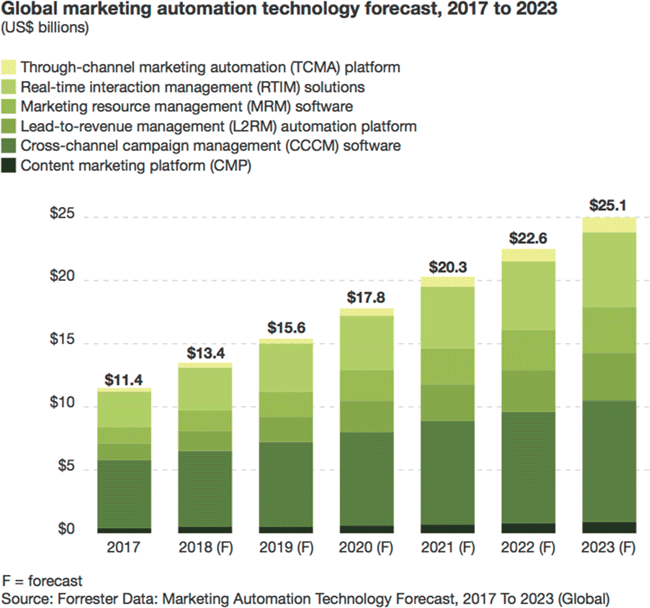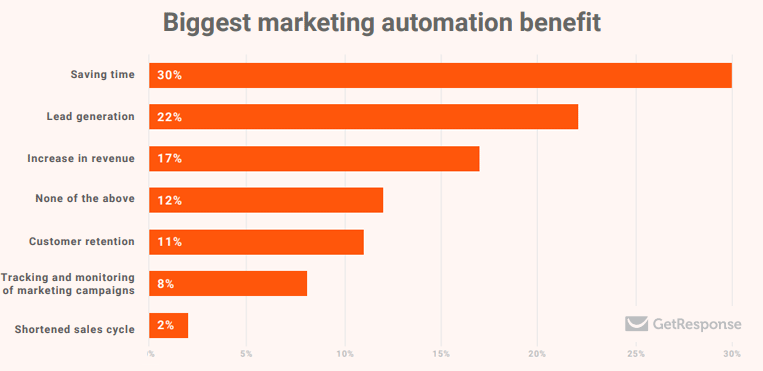

As the ever-changing demands of the customers rose, so did the need for a tool or software that could help marketers work in that direction, take up all their manual load, and let them focus on prospects and customers! That’s when the sun of Marketing Automation rose above the horizon and as of now, it’s pretty much shining brightly.
According to Martech Today, spending for marketing automation tool is expected to reach $25.1 billion annually by 2023.
In simple terms, it's a software used by marketing departments in automating, streamlining, and measuring marketing tasks, such as email, social media, and other website actions. The main purpose of adopting a marketing automation tool is to reduce human error and save time and resources for the tasks that would eventually take a lot of time when done manually. It has been found that automation increases qualified lead generation by approximately 451% and sales productivity by 14.5%, and reduces marketing overhead by 12.2%.
So let’s dive in and understand why it’s time that you invest in Marketing Automation too!
Marketing automation has definitely changed the way companies interact with their prospective and current customers. It helps in identifying the interests of the leads and customers who visit your website. BD Venture and Ehsan Jahandarpour published an eye-opening infographic, which found out that automating repetitive tasks such as emails, website actions, texts, social media posts, and so on gives you ample amount of free time that can be used to focus on other important marketing tasks, such as developing and launching campaigns.
As per the infographic, one can save at least 6 hours a week by automating social media posts. Also, it saves up to 80% of your time that you spend on scheduling content and managing workforce and eventually increases your team’s productivity and efficiency. Why didn’t we know this before?
Tired of switching to various platforms for gathering data and interpreting the results? Well, marketing automation has got your back here. It can easily optimise social media, email, content, and mobile marketing on a single platform through a multi-channel or omnichannel approach by following the 4R rule - using the right channel to engage the right brand with the right person at the right time!
According to research, 87% of the retailers have vouched for the success in business with an omnichannel strategy, however, only 8% of them could actually overcome the technological barrier associated with it. This resulted in the invention of one-stop solutions to manage various aspects of the marketing strategy.

Personalisation is the key to everything in today’s scenario. According to a report by Pardot, 77% of buyers want unique and targete content at each stage of their research process. Marketing automation tools help you understand which emails are working well, what’s the CTR, what’s the exit rate on your website, which social channel and mode of communication is driving most engagement, and a lot more.
Dell, created ads on the basis of customers’ web histories and that resulted in 70% increase in CTR and 300% increase in conversion rates. That’s the power of a marketing automation tool!
Similarly, a marketing automation tool lets you test and compare different marketing strategies such as landing pages and campaigns in a meaningful way. When you compare and test them time and again, it gets easier to identify the ones that are working well and generating the highest ROI. A sophisticated marketing automation tool helps you in A/B testing, knowing the marketing funnel direction, revenue generation, nurturing, and re-engaging your customers through meaningful, need-based campaigns.
Lead generation begins with converting visitors into leads. How does marketing automation do that? When a person visits your website or a landing page, through marketing automation, you can capture their email addresss. Marketing automation tools also use the demographics of the visitors to send them relevant and personalised content. This engages the visitors and warms up those who might not be very interested at an early stage.
Coursera sends different emails to recommend their visitors free online programs from the world’s top-notch Universities. They keep the customer engaged through conversations, such as reminding them of their next lessons or assignments and sending them more free or paid courses relevant to their current interests; ultimately converting visitors into leads.
Now, using implicit data (based on a lead’s behaviour, such as submissions, clicks, views, etc) a score is totaled and assigned to each lead. This is known as lead scoring. Those who get higher scores are the ones who are more interested in your brand, take less time to close and want to be up-to-date with your latest services.
On the other hand, explicit data (decided by the sales team based on how closely the lead matches an ideal customer’s profile), lead grades are assigned. These individuals are your quality leads. As per every successful business, quality leads are more important to give your time to than their quantity. The whole marketing funnel is based on quality leads, the ones you can nurture by sending relevant and personalised content and product/service recommendations.
As per Brian Downard and Ehsan Jahandarpour’s infographic, an increase in revenue generation has been noticed by almost 78% of marketers and around 75% of brands have seen ROI within 12 months of adopting a marketing automation tool. Here’s how marketing automation helps you measure your ROI:
Marketing automation tools have a record system, which provides you with all the information needed to measure the ROI. After gathering the data, you can run tests to compare landing pages, campaigns, offers, designs, and so on. This comes of great use when you want to know what works best to enhance sales and generate revenue.
MA platforms effectively calculate revenue generation and result comparisons for various campaigns. They help in identifying the factors that compare the efficiency and effectiveness of the current and previous marketing strategies through comparisons, helping you understand where to focus next.
With a marketing automation tool, you can easily measure the flow of leads and predict nuances and loopholes in impact marketing that eventually affects revenue generation. With this information, you can take required decisions and optimise ROI-related processes.

Marketing automation is a comprehensive suite that combines multiple functions in one tool. From getting sales and marketing on the same page, offering personalised content, building a 360 degree view of your customers, and offering insightful data for better decisions, marketing automation has gone beyong simply being an automation tool. When used optimally, it can be the biggest asset for any organisation or business.
Which marketing automation tool are you using? Need help in understanding which tool will work best for you? Contact us today!